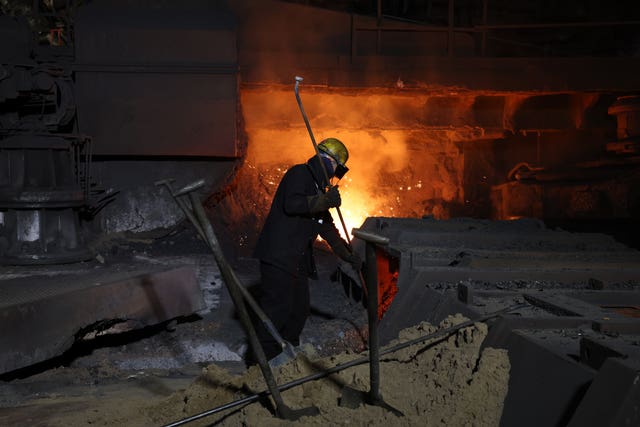Almost £100 million spent on British Steel nationalisation so far, minister says
Jonathan Reynolds said the £94 million spent on the Scunthorpe site is ‘considerably less’ than allowing its collapse.

Almost £100 million has been spent on the nationalisation of British Steel so far, the Business Secretary said, as he rejected the Tories’ accusation that Government budgets will be raided.
Jonathan Reynolds said the £94 million spent on the site in Scunthorpe, North Lincolnshire, is “considerably less” than allowing its collapse, which would have been an “incredible cost” to the Exchequer.
This came as business minister Sarah Jones told MPs a proposal to build an iron pellet site at Port Talbot’s steelworks is being supported by the Government.
The Government has faced criticism since the plant’s final two blast furnaces were shut in September. MPs said workers in South Wales have been let down in comparison with those retaining jobs in Scunthorpe.
In a back and forth in the Commons on Thursday, shadow business secretary Andrew Griffith said: “The Secretary of State has said that all of the funding required for the nationalisation of British Steel will come out of existing budgets.
“We’ve seen his department’s budget, we had an estimates debate day in this House not long ago, there was no unallocated pot.
“So could the Secretary of State be a bit more specific with this House about exactly which budget the money is coming from?”
Mr Reynolds replied: “There was the allocation of the green steel fund of £2.5 billion, and of course that came in addition to the £500 million for Port Talbot for the transformation which was agreed under the previous government, but wasn’t in the departmental accounts, he knows it was in a heavily oversubscribed Treasury reserve.
“But yes, the green steel fund will be there to support what we’ve had to do at Scunthorpe.”
Mr Griffith then said: “I think it’s widely agreed the cost of nationalising British Steel could run into billions, is he really saying that he plans to raid the previous allocated £2.5 billion green steel fund from the national wealth fund? How is he doing that, given that the national wealth fund is operationally independent?
“And isn’t the truth that sooner or later, this will have to come from his department’s budget at the expense of financial support for the automotive sector, for exporters, or hardworking trade negotiators?”
Mr Reynolds said: “I recognise his concern, but no, I’d like to reassure him on that point. So the options available to the Government – first of all, the total collapse of British Steel would have had an incredible Exchequer cost, well over £1 billion.

“The request, the second option, from Jingye for £1.2 billion, which apparently the leader of the Opposition says she did or didn’t agree to in some way with it going to Teesside, very significant cost to that.
“What we have done so far is provide working capital to British Steel in order to pay wages, in order to continue the purchase of raw materials, and the operation of the business.
“Of course, those costs, where they are incurred by the company, will be incurred by the company, because they enable that company to produce steel and then to sell that steel.
“So I will write to him with the details if he’s not confident of the decisions that we have made, but I tell him, this was the right decision, not just for the steel industry, but for the taxpayer as well.”
Conservative MP James Wild (North West Norfolk) said: “Will the Secretary of State be straightforward with the House today – how much taxpayers’ money has been spent so far on British Steel?”
Mr Reynolds replied: “The amount of working capital provided for British Steel to date stands at £94 million, which is considerably less, of course, than if we had given a large amount of money to Jingye, or if we had to deal with the complete loss of the entire British Steel site and business.”
Elsewhere in business questions, Labour MP Carolyn Harris (Neath and Swansea East) said: “Can the minister assure the steel communities of South Wales that they will receive a substantial share of the £2.5 billion steel fund?”
Business minister Sarah Jones replied: “We renegotiated the deal with Port Talbot and the £500 million that goes alongside that.
“I had a good meeting this week with Blastr, who are looking to build an iron pellet plant in the Port Talbot site, if possible, and we’re trying to support that.
“And of course, we have had our focus in recent weeks on Scunthorpe and British Steel, but the steel fund still remains, the steel plan is still being worked on, that is very broad and hopes to lift the entire UK steel industry.”





